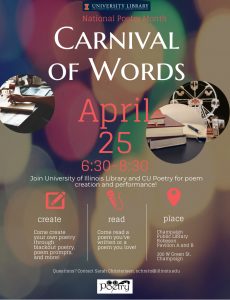National Poetry Month Event
Carnival of Words
April 25, 6:30-8:30 in Champaign Public Library
contact Sarah Christensen for more info: schristn@illinois.edu



National Poetry Month Event
Carnival of Words
April 25, 6:30-8:30 in Champaign Public Library
contact Sarah Christensen for more info: schristn@illinois.edu

[Following are an edited version of the opening remarks delivered by Dave Morris at the New Academy Series event held on Friday, April 6th 2018.]
Good afternoon! I’m so glad to see you all. Thanks for coming today to hear Mary Lucille Hays read from her work. We want to thank Paula Carns and the Literatures and Languages Library for hosting our event.
Since we last met, a lot has happened! A lot has happened just this week, even. And all of it has had me thinking about what it’s like not just to be in a community, but to maintain it and make it how we want it. I’ve been thinking about how important it is on the one hand to build—to make communities, to make connections both strong and weak, to work together to create a culture that works justly for everyone. And on the other hand, how important it is to be willing to jam things up—to shut things down to force power and institutions to open, just a little, the space and institutional environment that allows building to happen.
We were proud to support the GEO strike not only because we think TAs deserve better, but because we recognized the GEO strike as an important act of jamming. That jamming was only possible, however, because of years of hard building that GEO members did. They did this building through kindness and community, but just as importantly, they did this building with a willingness to have hard conversations, to argue, to stay in the room even with anger and hurt feelings, to show up and come back even when it’s hard.
I was reminded of this earlier this week as I sat in a well-attended, contentious faculty meeting in which the tenure-stream faculty debated the important topic of restructuring the undergraduate English major. The meeting was tense; there was quite a bit of anger and frustration in the room as our professors – many of them my beloved grad school mentors – debated the proposed structure of the new major AND the procedures by which that proposed curriculum was created and will ultimately be decided. Hovering on top of those important issues and strong feelings was, in my mind, a more distracting narrative of despair: ‘this is terrible; this is so unpleasant!’
The frustration, anger, and inter-personal conflicts in the room genuinely were unpleasant and difficult to get through, and I don’t mean to dismiss the pain that many people felt (particularly those who worked so hard on trying to figure out how to restructure the major). Nonetheless, hard debates, annoying procedures, backward and forward movement, incredibly slow movement, strong feelings, even hurt feelings, are part of building. They are features, not bugs. Experienced consistently and with commitment, they provide the bedrock of communities that function – not perfectly, but steadily. They provide the foundation of communities that get to do the more joyful building, the kind where we share our work, the responsibilities and joy of our teaching, and the simple pleasure of each other’s company. Two-week strikes are what democracy looks like; hard processes in tense rooms are what democracy looks like; and conversations like the ones we have here are what democracy looks like.